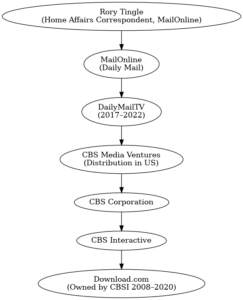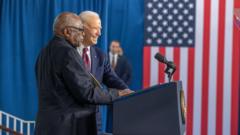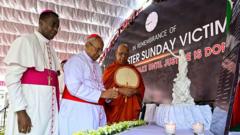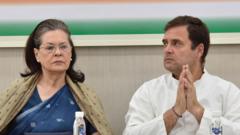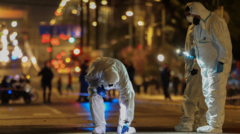Indian politics faces significant upheaval as opposition parties accuse the Election Commission of irregularities in the 2024 elections, leading to intense debates and detentions of key opposition figures.
Allegations of Vote Manipulation Ignite Political Turbulence in India

Allegations of Vote Manipulation Ignite Political Turbulence in India
Opposition leaders challenge the integrity of the electoral process, alleging 'vote theft' favoring the ruling party amid ongoing nationwide elections.
A significant political controversy has erupted in India following allegations of "vote theft," with opposition parties claiming the country's election regulatory body, the Election Commission of India (ECI), favored the ruling Bharatiya Janata Party (BJP) during the 2024 general elections. The situation escalated on Tuesday when parliament was adjourned due to opposition demands for a debate regarding electoral integrity. This outcry follows the detention of numerous opposition leaders, including prominent Congress figure Rahul Gandhi, during a protest march towards the ECI headquarters in New Delhi.
The allegations first emerged during a press conference held by Gandhi on August 7, where he asserted that the ECI's actions had jeopardized the fairness of the electoral process. Gaining momentum, opposition lawmakers rallied behind his claims. The Election Commission and BJP officials have firmly rejected these allegations.
Rahul Gandhi has accused the ECI of widespread voter manipulation, referencing specific data obtained from the electoral body itself, which both the ECI and BJP challenge. Although Prime Minister Narendra Modi achieved a historic third term, the ruling coalition failed to secure the overwhelming majority initially projected. Voter turnout for the elections stood at an average of 66%, with approximately a billion registered voters participating.
Specifically, Gandhi cited instances from Mahadevapura, a part of Bangalore Central, where he claimed over 100,000 fraudulent entries had been registered, including duplicated identities and incorrect addresses. He highlighted troubling cases of voters, like Shakun Rani, allegedly casting multiple ballots, a claim the ECI disputes. Furthermore, he raised concerns about the deletion of CCTV footage from polling stations and reported that as many as 80 individuals were registered at a single address in Mahadevapura. Gandhi derives his conclusion that these alleged irregularities cost his party at least 48 parliamentary seats. Despite winning 99 out of 543 seats, they lagged significantly behind the BJP's 240.
In response to these accusations, the ECI took to social media, calling Gandhi's claims "absurd" and demanding either a formal retraction or a signed declaration to corroborate his allegations. The ECI's Karnataka unit pointed out that the Congress party failed to file formal objections during the prior electoral roll revisions.
The BJP's leadership has denounced these allegations as political chaos that threatens the integrity of Indian democracy. Key figures, including Federal Education Minister Dharmendra Pradhan and Agriculture Minister Shivraj Singh Chouhan, characterized the opposition's claims as damaging to constitutional institutions.
The controversy surrounding Gandhi's statements has intensified amid an ongoing electoral roll revision in Bihar, leading to concerns over disenfranchisement. The Special Intensive Revision aimed to eliminate duplicate and deceased voters but has drawn criticism for potentially disenfranchising many migrants and minority communities. Reports suggest numerous discrepancies, including voters with incorrect photographs and deceased individuals still listed.
As cases continue to unfold in courts, the Indian Supreme Court is currently reviewing numerous petitions challenging the electoral roll revision in Bihar, amid allegations of considerable voter removals. The unrest, exemplified by Gandhi's mounting claims of systematic fraud, represents a pivotal moment in India's electoral landscape, leaving observers questioning the stability and transparency of the democratic process.


